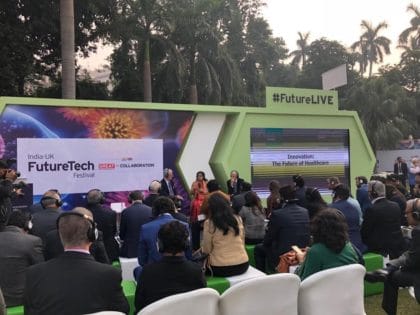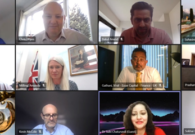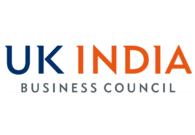The Tech Collaboration Defining India’s Healthcare Horizon
India’s healthcare sector was one of the hot talking points at the India-UK FutureTech Festival, in New Delhi, last week.

Disruptive technologies such as AI and the IoT can have a direct and immensely positive impact. They improve the quality of diagnoses and treatments, making healthcare more economical and more accessible for Indian citizens.
The event could not have come at a more important time. Ayushman Bharat – the world’s largest health insurance scheme, launched by the Modi government earlier this year – aims to extend healthcare insurance to 500 million poor and vulnerable people in India. Technological partnership will play a crucial role in enabling the scheme’s success.
In this context, experts discussed the UK’s role in enabling India to deliver the nation’s healthcare future. Home to world-class academic and research centres – such as Oxford, Imperial College, University College London, and the Alan Turing Institute – the UK has built a wealth of knowledge in healthcare tech. Speakers and panellists delved into specific medical problems that UK companies and its leading universities can solve in India.
There are numerous examples of how UK expertise can be utilised in practice to improve lives in India. More than one-third of Indian patients with diabetes are estimated to also suffer from diabetic retinopathy, with the country’s blind count being the highest in the world. A deep learning algorithm software, developed by the UK firm Visulytix, that identifies serious eye disorders can be made available in government hospitals in remote areas.
According to Crispin Simon, Her Majesty’s Trade Commissioner to South Asia, 85% of lung cancer cases in India are diagnosed at Stage 3 or 4 – by which time treatments are likely to be less effective. The University of Oxford has an AI solution that can identify lung cancer in digital CT scans. A similar gap can be bridged in cervical cancer, where India accounts for 25% of deaths worldwide. AI can diagnose the disease at a primary care level and save lives.
As part of the endeavour to strengthen the UK-India partnership, a Healthcare AI catalyst was launched at the Futuretech Festival. The catalyst represents an important step for collaboration between the UK Department of International Trade and the Indian government think tank NITI Aayog. With £1 million in funding, the programme will enable some of the best AI healthcare companies from the UK to deploy their solutions in Indian public hospitals and Primary Health Centres. The aim is to tackle some of the biggest diseases faced by Indians today, and the first five shortlisted companies were announced at the festival.
Mr Simon said:
“As India starts from scratch, it is wonderful to be able to design in something like AI in diagnosis because it is much harder to retrofit it if you’ve got different systems of diagnosis already.”
Towards building a new healthcare system in India, UK India Business Council (UKIBC) in its recent report on ‘Drug Pricing in India’ makes the case for India to follow the lead of many established healthcare markets in striking an optimum trade-off between public need and business sense. Ayushman Bharat will rapidly increase demand for pharmaceuticals, which will require a new, equally ambitious regulatory framework that can ensure availability sustainably matches affordability for Indian citizens.
It’s worth noting that AI-powered applications will be accompanied by certain challenges – they require an effective framework of laws to govern privacy and data integrity, while also dealing with issues of cultural acceptance, informed consent and liability. India presently is in a unique position to be a driver in the AI and healthcare space, with its large amounts of data and a growing start-up community. All signs point to the Ayushman Bharat scheme being a defining moment.
This is the third, and final, blog in our FutureTech series: a collaboration between Apurva Kadam from Magenta Communications and UKIBC, after attending the India-UK FutureTech Festival 2018. Both the UKIBC and Magenta Communications are committed to ensuring the inspiration and ideas of the FutureTech Festival thrive well after the event in our ongoing work supporting UK-India tech collaboration.
The India-UK FutureTech Festival 2018
UKIBC hosted a televised session at the India-UK FutureTech Festival in Delhi this past December kindly hosted by the Department for International Trade (DIT). The panellists included Taneia Bhardwaj, Anchor & Senior News Editor, ET NOW, Richard Heald, UK India Business Council, Dr Ashutosh Natraj, CEO, Vidrona, Larry Stone, Chairman, BT India, Bipin Preet Singh - Founder CEO – MobiKwik, Ron Mobed, Chief Executive Officer, Elsevier and Kshitij Shah, Principal, 3one4.
Credit for these photos goes to the 'UK in India' (their full album of photos from the FutureTech Festival can be found at the UK in India flickr account).






